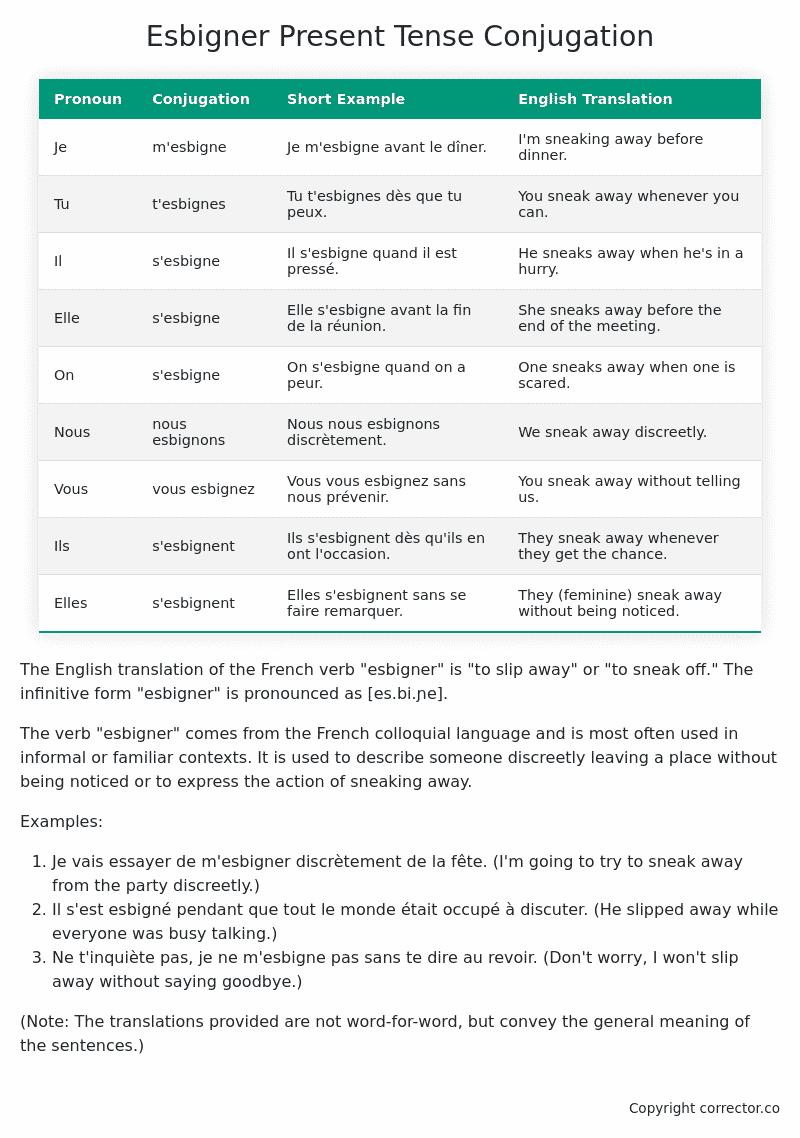Le Present (Present Tense) Conjugation of the French Verb esbigner
Introduction to the verb esbigner
The English translation of the French verb “esbigner” is “to slip away” or “to sneak off.” The infinitive form “esbigner” is pronounced as [es.bi.ɲe].
The verb “esbigner” comes from the French colloquial language and is most often used in informal or familiar contexts. It is used to describe someone discreetly leaving a place without being noticed or to express the action of sneaking away.
Examples:
- Je vais essayer de m’esbigner discrètement de la fête. (I’m going to try to sneak away from the party discreetly.)
- Il s’est esbigné pendant que tout le monde était occupé à discuter. (He slipped away while everyone was busy talking.)
- Ne t’inquiète pas, je ne m’esbigne pas sans te dire au revoir. (Don’t worry, I won’t slip away without saying goodbye.)
(Note: The translations provided are not word-for-word, but convey the general meaning of the sentences.)
Esbigner – About the French Present Tense
To take a deep dive into all the French tenses then see our article on Mastering French Tense Conjugation.
Common Everyday Usage Patterns For Le Present
Interactions with Other Tenses
Table of the Present Tense Conjugation of esbigner
| Pronoun | Conjugation | Short Example | English Translation |
|---|---|---|---|
| Je | m’esbigne | Je m’esbigne avant le dîner. | I’m sneaking away before dinner. |
| Tu | t’esbignes | Tu t’esbignes dès que tu peux. | You sneak away whenever you can. |
| Il | s’esbigne | Il s’esbigne quand il est pressé. | He sneaks away when he’s in a hurry. |
| Elle | s’esbigne | Elle s’esbigne avant la fin de la réunion. | She sneaks away before the end of the meeting. |
| On | s’esbigne | On s’esbigne quand on a peur. | One sneaks away when one is scared. |
| Nous | nous esbignons | Nous nous esbignons discrètement. | We sneak away discreetly. |
| Vous | vous esbignez | Vous vous esbignez sans nous prévenir. | You sneak away without telling us. |
| Ils | s’esbignent | Ils s’esbignent dès qu’ils en ont l’occasion. | They sneak away whenever they get the chance. |
| Elles | s’esbignent | Elles s’esbignent sans se faire remarquer. | They (feminine) sneak away without being noticed. |
Other Conjugations for Esbigner.
Le Present (Present Tense) Conjugation of the French Verb esbigner (You’re reading it right now!)
Imparfait (Imperfect) Tense Conjugation of the French Verb esbigner
Passé Simple (Simple Past) Tense Conjugation of the French Verb esbigner
Passé Composé (Present Perfect) Tense Conjugation of the French Verb esbigner
Futur Simple (Simple Future) Tense Conjugation of the French Verb esbigner
Futur Proche (Near Future) Tense Conjugation of the French Verb esbigner
Plus-que-parfait (Pluperfect) Tense Conjugation of the French Verb esbigner
Passé Antérieur (Past Anterior) Tense Conjugation of the French Verb esbigner
Futur Antérieur (Future Anterior) Tense Conjugation of the French Verb esbigner
Subjonctif Présent (Subjunctive Present) Tense Conjugation of the French Verb esbigner
Subjonctif Passé (Subjunctive Past) Tense Conjugation of the French Verb esbigner
Subjonctif Imparfait (Subjunctive Imperfect) Tense Conjugation of the French Verb esbigner
Subjonctif Plus-que-parfait (Subjunctive Pluperfect) Tense Conjugation of the French Verb esbigner
Conditionnel Présent (Conditional Present) Tense Conjugation of the French Verb esbigner
Conditionnel Passé (Conditional Past) Tense Conjugation of the French Verb esbigner
Conditionnel Passé II (Conditional Past II) Tense Conjugation of the French Verb esbigner
L’impératif Présent (Imperative Present) Tense Conjugation of the French Verb esbigner
L’impératif Passé (Imperative Past) Tense Conjugation of the French Verb esbigner
L’infinitif Présent (Infinitive Present) Tense Conjugation of the French Verb esbigner
L’infinitif Passé (Infinitive Past) Tense Conjugation of the French Verb esbigner
Le Participe Présent (Present Participle) Tense Conjugation of the French Verb esbigner
Le Participe Passé (Past Participle) Tense Conjugation of the French Verb esbigner
Struggling with French verbs or the language in general? Why not use our free French Grammar Checker – no registration required!
Get a FREE Download Study Sheet of this Conjugation 🔥
Simply right click the image below, click “save image” and get your free reference for the esbigner present tense conjugation!

I hope you enjoyed this article on the verb esbigner. Still in a learning mood? Check out another TOTALLY random French verb present conjugation!


